
African Journal of Library Archives and Information Science
Scope & Guideline
Championing Best Practices in Information Services.
Introduction
Aims and Scopes
- Library and Information Management:
Focuses on strategies, tools, and practices in managing library resources effectively, including the implementation of integrated systems and the impact of technology on library services. - Archives and Records Management:
Explores the principles and practices of managing records and archives, emphasizing their importance in governance, accountability, and cultural preservation. - Information Literacy and User Education:
Investigates the role of libraries in enhancing information literacy among users, particularly in academic settings, and the effectiveness of educational programs in fostering research skills. - Impact of Technology on Libraries:
Analyzes the influence of emerging technologies, such as artificial intelligence and digital platforms, on library services and user engagement, highlighting innovative practices in the field. - Research Productivity and Knowledge Dissemination:
Examines factors affecting research output and publication practices among librarians and researchers, with a focus on open access and scholarly communication. - Cultural and Societal Impacts of Libraries:
Studies the role of libraries in societal development, including their contributions to community engagement, cultural preservation, and conflict resolution.
Trending and Emerging
- COVID-19's Impact on Libraries and Archives:
The pandemic has prompted a surge in research exploring its implications for library and archival practices, particularly in crisis management and continuity planning. - Artificial Intelligence in Library Services:
There is a growing interest in the application of AI technologies to enhance library services, indicating a trend towards integrating advanced technologies into information management. - Open Access and Scholarly Communication:
Research on open access models and their impact on research dissemination is on the rise, reflecting the global shift towards more accessible academic publishing. - User Behavior and Information Seeking:
The exploration of user behavior, particularly among students and researchers, is increasingly prevalent, focusing on how users interact with digital resources and library services. - Indigenous Knowledge and Documentation:
There is an emerging focus on the role of libraries in documenting and preserving indigenous knowledge, highlighting the importance of cultural representation in information practices.
Declining or Waning
- Traditional Library Services:
As digital resources and online services gain prominence, traditional library services are receiving less attention, with fewer studies focusing on conventional reference or circulation services. - Physical Library Spaces:
The discourse surrounding the design and use of physical library spaces has waned, likely due to the increasing emphasis on virtual services and digital access. - Copyright Issues in Library Practices:
While copyright remains important, the frequency of papers addressing copyright literacy and related challenges has decreased, perhaps due to a shift towards broader digital rights discussions. - Community Library Services:
Research on community library services has become less prevalent, indicating a potential neglect of the vital role libraries play in local communities. - Historical Studies of Archives:
There appears to be a reduced focus on historical analyses of archival practices, as contemporary issues and technological advancements take precedence.
Similar Journals
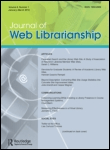
Journal of Web Librarianship
Elevating Library Services with Cutting-Edge ResearchWelcome to the Journal of Web Librarianship, an esteemed publication dedicated to the evolving landscape of library science and information technology. Published by Routledge Journals, Taylor & Francis Ltd, this journal serves as a vital platform for researchers and professionals to share innovative practices, methodologies, and research findings in the fields of Library and Information Sciences and Computer Science Applications. With an impressive impact factor reflected in its 2023 rankings—Q1 in Library and Information Sciences and Q2 in Computer Science Applications—the journal is well-positioned to influence the discourse and development within these disciplines. Since its inception in 2007, the Journal of Web Librarianship has continually contributed to the academic dialogue, ensuring a comprehensive understanding of the critical role that web technologies play in library services. Though it is not an open-access journal, it remains an invaluable resource for those dedicated to advancing the practice and theory of web librarianship. Join us in exploring the intersections of information and technology as we work towards a more informed society.
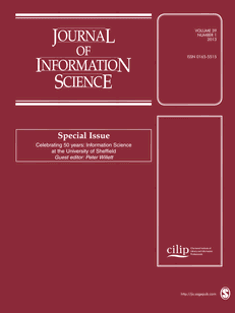
JOURNAL OF INFORMATION SCIENCE
Pioneering research in Library and Information Sciences since 1979.JOURNAL OF INFORMATION SCIENCE (ISSN: 0165-5515; E-ISSN: 1741-6485), published by SAGE PUBLICATIONS LTD, stands as a leading academic journal in the realms of Information Systems and Library and Information Sciences. Established in 1979 and continuing through 2024, this journal has become a cornerstone for researchers, professionals, and students seeking to enhance their understanding of the rapidly evolving landscape of information management. With a commendable Q1 ranking in Library and Information Sciences and a Q2 ranking in Information Systems as of 2023, it demonstrates significant influence, evidenced by its 89th percentile ranking in Scopus for Social Sciences. Although it currently does not offer open access, the journal is committed to delivering high-quality, peer-reviewed research that addresses both theoretical and practical challenges in the field. Researchers and practitioners alike will find invaluable insights that bolster their work and contribute to the broader academic dialogue surrounding information science.

DESIDOC Journal of Library & Information Technology
Empowering Research in Library and Information PracticesDESIDOC Journal of Library & Information Technology, published by the Defence Scientific Information Documentation Centre, is a pivotal scholarly platform in the realm of Library and Information Sciences. The journal, indexed with ISSN 0974-0643 and E-ISSN 0976-4658, has established its reputation with a commendable Q3 category ranking in the latest Scopus quartiles and a notable rank of 113 out of 280 in its field, placing it in the 59th percentile. Engaging a global audience, it disseminates high-quality research insights aimed at advancing the practices and technologies within library and information management. Operating within a converged timeframe from 2012 to 2024, the journal is committed to fostering robust discussions surrounding contemporary issues in the field, making it an invaluable resource for researchers, professionals, and students alike. While currently not offering open access, its content is accessible through institutional subscriptions, reinforcing its significance in the academic community of India and beyond.
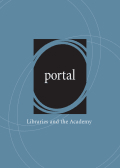
PORTAL-LIBRARIES AND THE ACADEMY
Empowering Librarians and Researchers for Future ChallengesPORTAL: Libraries and the Academy is an esteemed academic journal published by Johns Hopkins University Press, focusing on the intersection of library and information science, academic practice, and scholarly communication. With an ISSN of 1531-2542 and an E-ISSN of 1530-7131, this journal offers rigorous peer-reviewed research essential for librarians, researchers, and information professionals committed to enhancing academic libraries and fostering innovative practices in higher education. It holds a strong position in its field, ranking in the 61st percentile within Social Sciences and Library and Information Sciences, and categorized as Q2 in both Development and Library and Information Sciences for 2023. Though the journal is not Open Access, its content is invaluable for anyone interested in staying abreast of the latest trends and challenges in library services and academic environments. Since its inception in 2001, PORTAL has continuously contributed to the discourse on the evolving role of libraries in academia, making it a critical resource for those striving to bridge the gap between information access and higher education pedagogy.
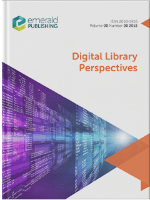
Digital Library Perspectives
Shaping Tomorrow's Information Systems TodayDigital Library Perspectives, published by Emerald Group Publishing Ltd, is a pivotal journal in the dynamic fields of Education, Information Systems, and Library and Information Sciences. With an impressive Scopus ranking that places it in the Q1 category for Library and Information Sciences and Q2 for both Education and Information Systems, this journal has established itself as a significant resource for scholars and practitioners alike. The journal's ISSN is 2059-5816 and its E-ISSN is 2054-1694, facilitating broad accessibility to cutting-edge research and innovative practices within digital library environments. Published since 2016, it continues to offer a platform for the exploration of emerging trends, challenges, and technologies affecting digital libraries and information services. Researchers, professionals, and students will find that the journal not only highlights critical advancements but also fosters discussions around best practices and future directions in the industry. While it operates under a subscription model, it remains a crucial contributor to the scholarly dialogue in this essential sector.

Libres-Library and Information Science Research Electronic Journal
Empowering research through open access and collaboration.Libres-Library and Information Science Research Electronic Journal, ISSN: 1058-6768, is a prominent open-access journal published by Nanyang Technological University Library in Singapore. Since its inception in 1996, Libres has dedicated itself to advancing the field of library and information sciences through a rich repository of research articles, fostering scholarly communication, and enhancing knowledge-sharing among academics, practitioners, and students alike. The journal supports an open-access mandate, allowing free and unrestricted access to its content, which is essential for fostering inclusivity and accessibility in research. Despite currently being positioned in the Q4 category for Library and Information Sciences and holding a Scopus rank of #185 out of 280, Libres is recognized as a crucial platform for emerging trends, innovative practices, and critical discussions in the discipline. The journal’s commitment to quality research and scholarly discourse makes it an invaluable resource for those looking to deepen their understanding and engage with the library and information sciences community.
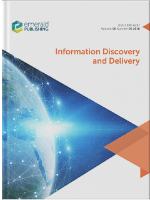
Information Discovery and Delivery
Connecting Researchers to Cutting-edge KnowledgeInformation Discovery and Delivery is a leading academic journal published by EMERALD GROUP PUBLISHING LTD, concentrating on the dynamic intersections of Computer Science and Library and Information Sciences. With an ISSN of 2398-6247, this esteemed journal has established its reputation by achieving a commendable Q2 ranking in both fields according to the latest quartiles, reflecting its commitment to advancing knowledge and practice in information discovery processes. With its Scopus ranking placing it in the 83rd percentile for Library and Information Sciences, and the 74th percentile for General Computer Science, the journal is recognized as an influential platform for researchers, professionals, and students alike. Its diverse and scholarly articles, spanning from its inception in 2017 through 2024, aim to explore innovative methodologies, technologies, and best practices that enhance information access and delivery systems. Although the journal is not Open Access, it remains an essential resource for those looking to delve into the latest findings and discussions shaping the landscape of information sciences. Join a community of thought leaders as we navigate the future of information discovery.
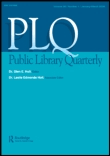
Public Library Quarterly
Exploring the future of community engagement in libraries.Public Library Quarterly, published by Routledge Journals, Taylor & Francis Ltd, is a premier scholarly journal dedicated to advancing the field of Library and Information Sciences. With an impressive impact factor and a distinguished ranking of Q1 in its category for 2023, this journal serves as a vital resource for both researchers and practitioners. Since its inception in 1979, it has explored the evolving role of public libraries in society, integrating contemporary research with practical insights. The journal is indexed in Scopus, ranking #69 out of 280 in the Library and Information Sciences category, placing it in the 75th percentile among its peers. Although it is not Open Access, the journal offers a wealth of knowledge on essential topics such as library management, community engagement, and information access, making it an indispensable tool for students, professionals, and scholars alike. Join a global community seeking to enhance public library services and contribute to the discourse on information accessibility and literacy in today's fast-changing landscape.
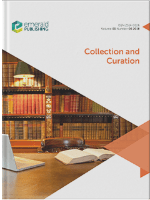
Collection and Curation
Exploring Innovative Strategies in MuseologyCollection and Curation is a prominent academic journal published by EMERALD GROUP PUBLISHING LTD, dedicated to the fields of Library and Information Sciences and Museology. With a significant impact in its domains, the journal has achieved a category quartile ranking of Q3 in Library and Information Sciences and Q2 in Museology as of 2023. It is noteworthy that in the Scopus rankings, it stands at an impressive #8 out of 83 in Museology, placing it in the 90th percentile, while also ranking #112 out of 280 in Library and Information Sciences, positioning it within the 60th percentile. Since its inception in 2018, the journal has been instrumental in advancing research and discussion around the critical themes of collection development and curation methodologies. Although it currently does not offer open access, the journal's rigorous peer-review process ensures high-quality scholarly contributions that are indispensable for researchers, professionals, and students aiming to enrich their understanding and practices in these important fields. By focusing on innovative strategies, practices, and case studies, Collection and Curation continues to shape the future of information management and museum studies.

Bibliotecas-Anales de Investigacion
Connecting Researchers with Library InsightsBibliotecas-Anales de Investigacion is a prominent scholarly journal dedicated to the field of Library and Information Sciences, published by BIBLIOTECA NACL CUBA JOSE MARTI, with its esteemed presence based in Havana, Cuba. This journal (ISSN: 0006-176X, E-ISSN: 1683-8947) plays a crucial role in disseminating research and insights relevant to the evolving landscape of library operations, information management, and user services. Acknowledged for its rigorous peer-review process, it is indexed in Scopus, currently classified in the 2023 Q4 quartile, ranking 199 out of 280 in its category, marking a significant contribution to the academic community despite its modest percentile of 29th. The journal welcomes original research articles, case studies, and reviews that explore contemporary issues and developments in library science, creating an inclusive platform for both seasoned scholars and emerging voices. Interested readers can anticipate a robust exploration of topics from information retrieval to digital libraries, aligning with the journal's objective to enhance knowledge and practice within the library and information sector. As the journal converges its themes from 2019 to 2024, it remains a vital resource for researchers, professionals, and students aiming to stay informed on the latest trends and innovations in the field.